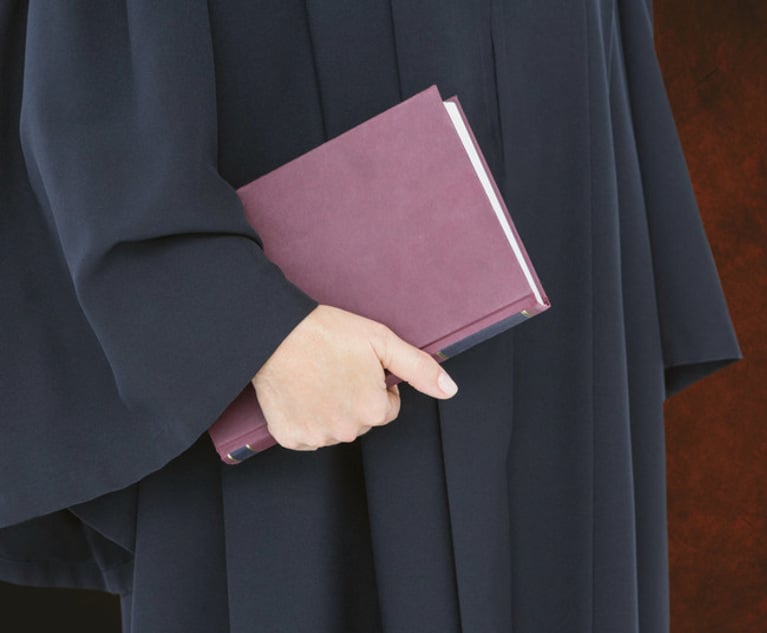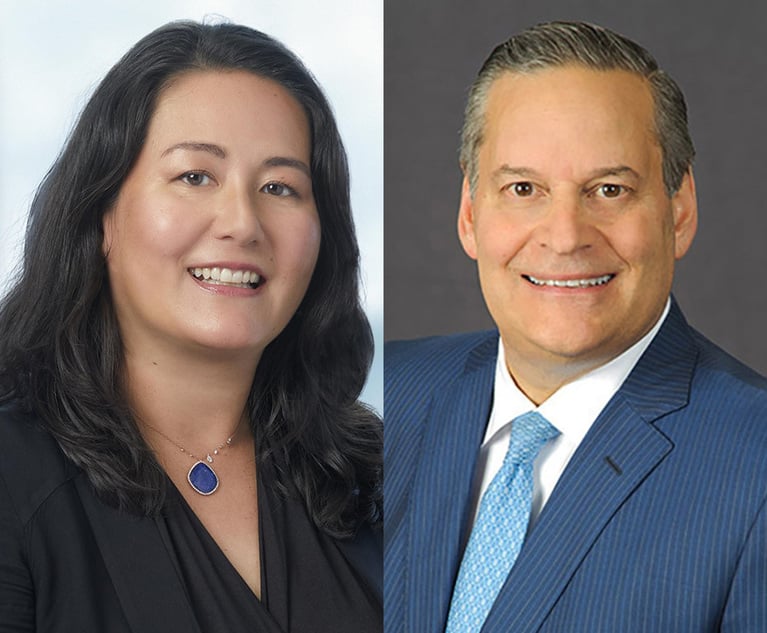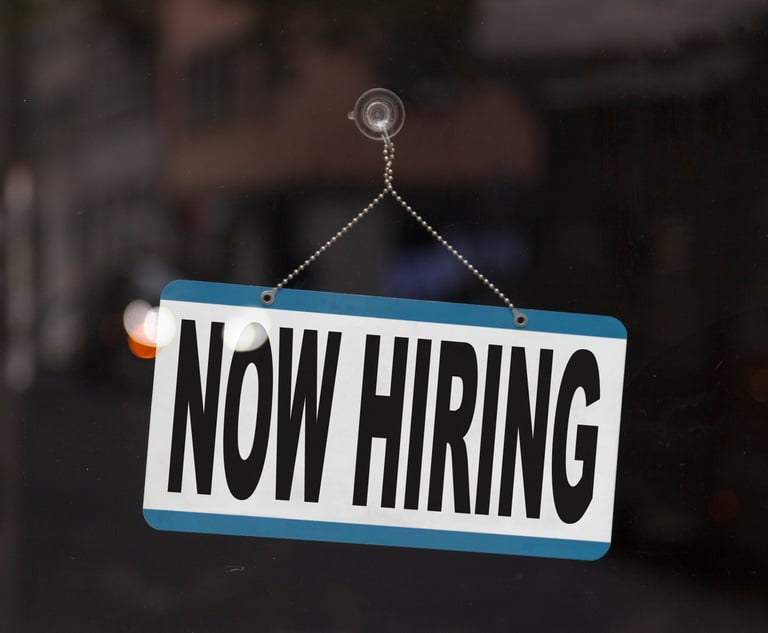Judges, Critics Debate Proposed New Rule 22 Governing Court Recordings
Judges working to hammer out a new superior court rule governing how and when recording devices may be used in court got a push from all sides seeking changes in the current draft.
December 20, 2017 at 02:25 PM
7 minute read

The Cobb County Superior Court judge overseeing the rewriting of the rules governing the use of cameras and recording devices in Georgia's state courts admitted Tuesday it's a touchy task.
Judge Stephen Schuster said he and his colleagues have gotten an earful as they attempt to balance the needs of judges, lawyers, defendants, litigants, the media and the public in crafting a new Rule 22 governing the use of such devices.
At a Tuesday meeting hosted by Georgia Supreme Court Justices David Nahmias and Nels Peterson, representatives from all of those sectors were on hand to voice their approval or disapproval and to suggest fixes before the final draft is submitted to the Georgia Supreme Court for approval.
Schuster, who chairs the Rules Committee of the Council of Superior Court Judges, said the current 1985 vintage Rule 22, which predates cellphone cameras, tablets and laptops, has been criticized as too restrictive and unwieldy. It's also often unenforceable when recording devices can be switched on surreptitiously.
“We've tried to craft a rule that will keep judges from shutting you out,” said Schuster, whose committee solicited input from organizations including the Georgia Public Defender Council, Southern Center for Human Rights, Georgia Association of Criminal Defense Lawyers, Georgia First Amendment Foundation and Atlanta Journal-Constitution, among others.
Even so, “we got a lot of comments that we're nefarious judges trying to hide what we do in the courtroom,” he said.
On the other hand, “a lot of my colleagues are saying, 'Why are you even doing this? What we have is fine,'” Schuster said.
Nahmias said there are two areas of “overarching” concern: potential restrictions on the use of recording-capable devices for tasks other than recording, which is a necessity for lawyers and their support staff, and the illicit recording of court proceedings, witnesses and court or law enforcement officials.
There are instances of witnesses and victims in gang cases showing up on social media websites, and Schuster said some witnesses are “terrified” to testify for fear their images will go public.
The proposed rule allows lawyers to use their devices but requires jurors, witnesses, parties and spectators to turn off their devices while in the courtroom.
The proposed rule also only allows lawyers to record courtroom proceedings if there is no court reporter present.
Another change mandates that news media and other parties wishing to record court proceedings must file a written request “at least 24 hours where practicable” prior to a proceeding. The judge must then notify parties and witnesses and, if any object, “promptly hold a hearing” on the matter.
The current Rule 22 only requires an unspecified “timely” request. Many courts have initiated their own 24-hour limit. Fulton County's Rule 22 application, for instance, states that 24 hours is required for the application “to be deemed timely.”
Another section bars any recording when the judge is not on the bench.
In letters and comments, those proposed changes and others were picked apart Tuesday.
Jones Day partner Peter Canfield, representing the First Amendment Foundation, said a blanket requirement that all nonlawyer court attendees turn off their phones flew in the face of the courts' professed openness to the public.
“The question is, are you going to set the rules to deal with the worst cases?” he said. While a criminal case may require such steps, he said, a proceeding may deal with constitutional or policy issues that the public should be able to record.
“The assumption should be that they're not all rule-breakers and gang members,” Canfield said.
Canfield also said the 24-hour notice requirement, even with the “where practicable” qualifier, could be considered a mandate by some judges.
That point was echoed by Kilpatrick Townsend partner Tom Clyde, representing the AJC and WSB.
“News is very quick,” said Clyde, pointing out that a late-breaking event such as an unscheduled first appearance hearing would preclude a reporter's ability to file a request unless the judge agreed.
He also noted there are occasions when a witness at a “relatively mundane trial gives newsworthy testimony,” sending reporters scrambling for footage.
Canfield also urged the panel to include language reminding judges of Georgia's “policy favoring open judicial proceedings” to help ensure that granting access is the rule, not the exception.
Southwestern Circuit Public Defender Sam Merritt raised concerns about the provision barring attorneys from recording proceedings where a court reporter is present, noting that jailed defendants would have to wait for an official transcript before moving forward on a case.
Merritt added that nonlawyer pro se litigants would be barred from recording under the proposed rule.
Ashleigh Merchant of Marietta's Merchant Law Firm, representing GACDL, said that provision seemed geared toward “protecting court reporters' income,” and she also targeted the proposal to have everyone but lawyers shut down their devices.
In the midst of what can often be multiple proceedings in various courtrooms, it is essential that lawyers be able to stay in touch with assistants, paralegals and witnesses, Merchant said.
“During hearings in divorce cases, moms have to have their phones so they can stay in touch with their kids,” she said.
GACDL President Angie Coggins, who phoned in to the meeting, agreed and wondered what sort of penalty might be in store for someone who texted or checked email in court.
The proposal says that violations “may be grounds for removal or exclusion from the courtroom and contempt,” Coggins noted.
“What does that mean?” she asked. “Excluded permanently? Ordered never to do it again?”
GACDL opposed the entire rule by letter, and afterward Coggins—emphasizing she was speaking for herself—said via email that “the 'fears' propounded as a reason for this rule seem to be born of isolated incidents that have caused a knee-jerk reaction, thus leading to a blanket rule that serves no legitimate purpose, especially considering that judges and others already have rules and procedures in place to deal with such rare situations.”
Also invited was citizen journalist Nydia Tisdale, who records and posts unedited video of public meetings, court proceedings and public events on her website.
Tisdale (who on Monday was sentenced to 12 months' probation, 40 hours of community service and $1,000 fine after being convicted earlier this month of misdemeanor obstruction stemming from her forcible ejection from a 2014 political rally) said she worried about the provision barring recording when the judge is off the bench.
She noted that there is often action in the courtroom when the judge leaves the bench, such as after delivering a verdict or for a brief break while other proceedings are ongoing.
“I like to record people in the courtroom, the reactions of the crowd,” she said. “The personal element is what I want to share.”
An earlier version of this story omitted the 12 months included in Tisdale's sentence.
This content has been archived. It is available through our partners, LexisNexis® and Bloomberg Law.
To view this content, please continue to their sites.
Not a Lexis Subscriber?
Subscribe Now
Not a Bloomberg Law Subscriber?
Subscribe Now
NOT FOR REPRINT
© 2025 ALM Global, LLC, All Rights Reserved. Request academic re-use from www.copyright.com. All other uses, submit a request to [email protected]. For more information visit Asset & Logo Licensing.
You Might Like
View All

Sanctions Order Over Toyota's Failure to Provide English Translations of Documents Vacated by Appeals Court
4 minute read
Burr & Forman, Smith Gambrell & Russell Promote More to Partner This Year
7 minute readTrending Stories
- 1Capital Markets Partner Rejoins O’Melveny Ahead of Expected Uptick in Demand
- 2Pharma Company Faces Breach-of-Contract Claim Over $1.3 Million in Unpaid Invoices
- 3KPMG Law Seeks Alternative Business License, Shaking Up Legal Status Quo
- 4Pittsburgh's Reed Smith, K&L Gates Join Fight to Save Nippon Steel-U.S. Steel Merger
- 5Milbank, Wachtell, Ropes and Pittsburgh Duo Aim to Save Nippon Steel-U.S. Steel Merger
Who Got The Work
Michael G. Bongiorno, Andrew Scott Dulberg and Elizabeth E. Driscoll from Wilmer Cutler Pickering Hale and Dorr have stepped in to represent Symbotic Inc., an A.I.-enabled technology platform that focuses on increasing supply chain efficiency, and other defendants in a pending shareholder derivative lawsuit. The case, filed Oct. 2 in Massachusetts District Court by the Brown Law Firm on behalf of Stephen Austen, accuses certain officers and directors of misleading investors in regard to Symbotic's potential for margin growth by failing to disclose that the company was not equipped to timely deploy its systems or manage expenses through project delays. The case, assigned to U.S. District Judge Nathaniel M. Gorton, is 1:24-cv-12522, Austen v. Cohen et al.
Who Got The Work
Edmund Polubinski and Marie Killmond of Davis Polk & Wardwell have entered appearances for data platform software development company MongoDB and other defendants in a pending shareholder derivative lawsuit. The action, filed Oct. 7 in New York Southern District Court by the Brown Law Firm, accuses the company's directors and/or officers of falsely expressing confidence in the company’s restructuring of its sales incentive plan and downplaying the severity of decreases in its upfront commitments. The case is 1:24-cv-07594, Roy v. Ittycheria et al.
Who Got The Work
Amy O. Bruchs and Kurt F. Ellison of Michael Best & Friedrich have entered appearances for Epic Systems Corp. in a pending employment discrimination lawsuit. The suit was filed Sept. 7 in Wisconsin Western District Court by Levine Eisberner LLC and Siri & Glimstad on behalf of a project manager who claims that he was wrongfully terminated after applying for a religious exemption to the defendant's COVID-19 vaccine mandate. The case, assigned to U.S. Magistrate Judge Anita Marie Boor, is 3:24-cv-00630, Secker, Nathan v. Epic Systems Corporation.
Who Got The Work
David X. Sullivan, Thomas J. Finn and Gregory A. Hall from McCarter & English have entered appearances for Sunrun Installation Services in a pending civil rights lawsuit. The complaint was filed Sept. 4 in Connecticut District Court by attorney Robert M. Berke on behalf of former employee George Edward Steins, who was arrested and charged with employing an unregistered home improvement salesperson. The complaint alleges that had Sunrun informed the Connecticut Department of Consumer Protection that the plaintiff's employment had ended in 2017 and that he no longer held Sunrun's home improvement contractor license, he would not have been hit with charges, which were dismissed in May 2024. The case, assigned to U.S. District Judge Jeffrey A. Meyer, is 3:24-cv-01423, Steins v. Sunrun, Inc. et al.
Who Got The Work
Greenberg Traurig shareholder Joshua L. Raskin has entered an appearance for boohoo.com UK Ltd. in a pending patent infringement lawsuit. The suit, filed Sept. 3 in Texas Eastern District Court by Rozier Hardt McDonough on behalf of Alto Dynamics, asserts five patents related to an online shopping platform. The case, assigned to U.S. District Judge Rodney Gilstrap, is 2:24-cv-00719, Alto Dynamics, LLC v. boohoo.com UK Limited.
Featured Firms
Law Offices of Gary Martin Hays & Associates, P.C.
(470) 294-1674
Law Offices of Mark E. Salomone
(857) 444-6468
Smith & Hassler
(713) 739-1250







